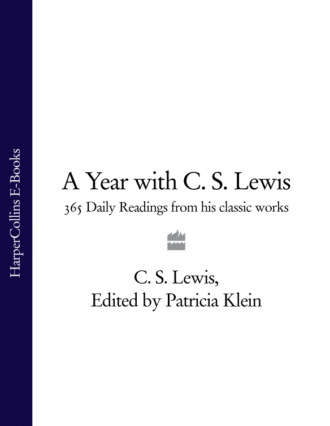
Полная версия
A Year with C. S. Lewis: 365 Daily Readings from his Classic Works
—from Mere Christianity
1926 Lewis gives his first lecture as a don in the English School at Oxford, entitled “Some Eighteenth-Century Precursors of the Romantic Movement.”
24 Finding Comfort
All I am doing is to ask people to face the facts—to understand the questions which Christianity claims to answer. And they are very terrifying facts. I wish it was possible to say something more agreeable. But I must say what I think true. Of course, I quite agree that the Christian religion is, in the long run, a thing of unspeakable comfort. But it does not begin in comfort; it begins in the dismay I have been describing, and it is no use at all trying to go on to that comfort without first going through that dismay. In religion, as in war and everything else, comfort is the one thing you cannot get by looking for it. If you look for truth, you may find comfort in the end: if you look for comfort you will not get either comfort or truth—only soft soap and wishful thinking to begin with and, in the end, despair.
—from Mere Christianity
25 We Couldn’t Make It Up
Besides being complicated, reality, in my experience, is usually odd. It is not neat, not obvious, not what you expect. For instance, when you have grasped that the earth and the other planets all go round the sun, you would naturally expect that all the planets were made to match—all at equal distances from each other, say, or distances that regularly increased, or all the same size, or else getting bigger or smaller as you go further from the sun. In fact, you find no rhyme or reason (that we can see) about either the sizes or the distances; and some of them have one moon, one has four, one has two, some have none, and one has a ring.
Reality, in fact, is usually something you could not have guessed. That is one of the reasons I believe Christianity. It is a religion you could not have guessed. If it offered us just the kind of universe we had always expected, I should feel we were making it up. But, in fact, it is not the sort of thing anyone would have made up. It has just that queer twist about it that real things have.
—from Mere Christianity
January 1917 Lewis (age eighteen) returns to Great Bookham, Surrey, and William T. Kirkpatrick (“the Great Knock”) to prepare for Responsions, the entrance examination for Oxford University.
26 Not Like a River but Like a Tree
We are not living in a world where all roads are radii of a circle and where all, if followed long enough, will therefore draw gradually nearer and finally meet at the centre: rather in a world where every road, after a few miles, forks into two, and each of those into two again, and at each fork you must make a decision. Even on the biological level life is not like a river but like a tree. It does not move towards unity but away from it and the creatures grow further apart as they increase in perfection. Good, as it ripens, becomes continually more different not only from evil but from other good.
—from The Great Divorce, Preface
1942 The Oxford University Socratic Club, Somerville College, Oxford, holds its first meeting. Lewis serves as its first president.
27 Being Good
Even the best Christian that ever lived is not acting on his own steam—he is only nourishing or protecting a life he could never have acquired by his own efforts. And that has practical consequences. As long as the natural life is in your body, it will do a lot towards repairing that body. Cut it, and up to a point it will heal, as a dead body would not. A live body is not one that never gets hurt, but one that can to some extent repair itself. In the same way a Christian is not a man who never goes wrong, but a man who is enabled to repent and pick himself up and begin over again after each stumble—because the Christ-life is inside him, repairing him all the time, enabling him to repeat (in some degree) the kind of voluntary death which Christ Himself carried out.
That is why the Christian is in a different position from other people who are trying to be good. They hope, by being good, to please God if there is one; or—if they think there is not—at least they hope to deserve approval from good men. But the Christian thinks any good he does comes from the Christ-life inside him. He does not think God will love us because we are good, but that God will make us good because He loves us; just as the roof of a greenhouse does not attract the sun because it is bright, but becomes bright because the sun shines on it.
—from Mere Christianity
1964 Letters to Malcolm: Chiefly on Prayer is published by Geoffrey Bles, London.
Конец ознакомительного фрагмента.
Текст предоставлен ООО «ЛитРес».
Прочитайте эту книгу целиком, купив полную легальную версию на ЛитРес.
Безопасно оплатить книгу можно банковской картой Visa, MasterCard, Maestro, со счета мобильного телефона, с платежного терминала, в салоне МТС или Связной, через PayPal, WebMoney, Яндекс.Деньги, QIWI Кошелек, бонусными картами или другим удобным Вам способом.


